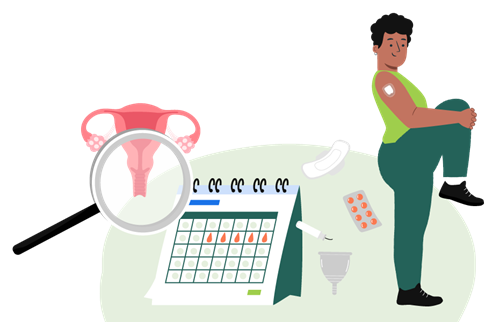Diabetes, Periods and the Menstrual Cycle

Many women and girls with diabetes notice that their blood glucose (sugar) levels can be affected by their periods. This, combined with cramps, mood swings and appetite changes, can make managing diabetes around periods very difficult.
Diabetes and Periods: What's the Link?
Periods (or menstruation) are a natural process that occurs in women and those assigned female at birth starting at around 12 years of age and continuing until menopause at around 50 years of age. A period occurs because of changes in the levels of hormones such as progesterone and oestrogen. These hormonal changes, particularly in progesterone, can result in a change in how the body responds to insulin, affecting the blood sugar level.
Many women notice higher blood glucose levels in the days before a period occurs. This is because the effects of insulin are reduced at this time.
Some women find their blood glucose changes around their period are similar from cycle to cycle, some find blood glucose changes vary from cycle to cycle, and some don’t find their period has any impact on blood glucose levels at all.
Tips for Managing Diabetes Around Periods
 |
Monitor blood glucose levels:Regular monitoring of blood glucose levels around periods can be helpful to understand the impact of your menstrual cycle on your diabetes and blood glucose levels. It can also help to understand when increased or decreased insulin doses might be the right thing to keep your blood glucose in range. |
 |
Think about what you eat:It’s common to have an increased appetite around periods, particularly in the days before your period starts. Cravings for carbohydrates are common. It’s important to be mindful of the foods you choose to eat and how these can affect your blood glucose levels. Avoiding foods high in sugar and sticking to balanced meals can help avoid blood glucose rising too high. |
 |
Speak with a healthcare professional:If you are finding managing diabetes around your period difficult, it’s a good idea to speak with a healthcare professional who will be able to help you find patterns and think about any medication adjustments. Additionally, if your periods are problematic or affecting your life due to pain or heavy bleeding, a healthcare professional will be able to discuss treatment options. |
Diabetes and Abnormal Periods
Period problems are more common in women with type 1 diabetes. Irregular and longer menstrual cycles are common, particularly in young women with type 1 diabetes and in women with higher HbA1c levels.
Irregular periods are also more common in women with type 2 diabetes, compared to those without, particularly in those who are overweight. Being overweight or obese is linked to irregular ovulation (the point in the menstrual cycle when an egg is released) and irregular periods, although the reason behind this is not fully understood.
If your periods are causing problems, a healthcare professional such as your GP will be able to help.
What about Diabetes and Contraception?
In addition to preventing pregnancy, some types of contraception can also be helpful to improve heavy, irregular, or painful periods.
Having diabetes won’t affect the range of contraception options available to choose from. Some women who start a contraceptive pill notice a slight effect on their blood glucose levels compared to before they started taking the pill. If you notice a change, regular blood sugar monitoring during your cycle and discussion with a healthcare professional can help understand if any changes are necessary.


